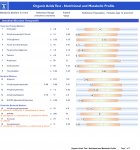- Messages
- 83
- Location
- Kent, England
Hello,
I've had severe constant gastric issues for nearly a year. They came on suddenly/last August, although prior to that I've often had mild issues with erratic bloating and nausea for about 10 years.
Symptoms are: loss of appetite, nausea, fullness, 'lead brick' in stomach feeling, pain after eating, general stomach discomfort and a feeling of irritation/rawness in the stomach. I've lost 21lbs already-and I am a small person so this represents significant weightloss.
I was diagnosed with gastritis in December 2016 but my symptoms have been unresponsive to PPIs, H2 blockers and diet changes (including gluten elimination). Doctors aren't much help so I'm trying to establish other possible causes for my gastric misery.
I would like to rule out SIBO/yeast/Candida as possible causes. I had an organic acid test done last December. I've uploaded the intestinal microbial growth page from my test. Is this a reliable indicator of any overgrowth in my stomach? Is the elevated arabinose significant?
Thank you for any comments/suggestions!
I've had severe constant gastric issues for nearly a year. They came on suddenly/last August, although prior to that I've often had mild issues with erratic bloating and nausea for about 10 years.
Symptoms are: loss of appetite, nausea, fullness, 'lead brick' in stomach feeling, pain after eating, general stomach discomfort and a feeling of irritation/rawness in the stomach. I've lost 21lbs already-and I am a small person so this represents significant weightloss.
I was diagnosed with gastritis in December 2016 but my symptoms have been unresponsive to PPIs, H2 blockers and diet changes (including gluten elimination). Doctors aren't much help so I'm trying to establish other possible causes for my gastric misery.
I would like to rule out SIBO/yeast/Candida as possible causes. I had an organic acid test done last December. I've uploaded the intestinal microbial growth page from my test. Is this a reliable indicator of any overgrowth in my stomach? Is the elevated arabinose significant?
Thank you for any comments/suggestions!

